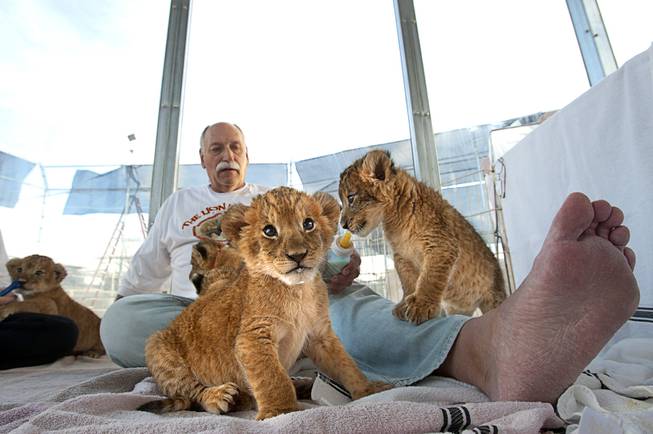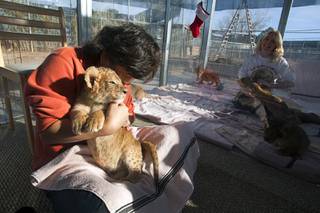
Steve Marcus
Three
and 4-week-old lion cubs are shown with Keith Evans at Lion Habitat
Ranch in Henderson on Sunday, Dec. 16, 2012. Keith and his wife Beverly
own the ranch. The habitat used to provide lions to the lion habitat at
MGM Grand but is now open to the public. MGM’s lion habitat closed in
January 2012.
Tuesday, Sept. 16, 2014
It’s been a few moons since we caught up with Keith Evans.
Like 15 years worth of moons.
It was in July 1999 when I met Evans and a few of the big cats he had just led into the then-new MGM Grand Lion Habitat. The attraction was about a week old then, a $9 million operation just off the casino floor across from where the entrance of Hakkasan sits today. Evans had 18 lions at the time, and officials were convinced that visitors young and old, from any region in the world, would visit the glass-encased habitat.
The Lion Habitat did remain in operation for all that time, outlasting many production shows including four versions of “EFX” in the theater that is now home to “Ka” and the outdoor MGM Grand Theme Park.
The resort finally ended its partnership with Evans and his lions in January 2012, a casualty of the hotel’s $160 million renovation that led to the construction of Hakkasan (in place of Studio 54) and the theater for Beacher’s Madhouse (in place of “Crazy Horse Paris”). The lions and staff are now in place at Lion Habitat Ranch on Bruner Avenue about 1 1/2 miles southeast of St. Rose Parkway.
This is Evans’ home, and home to what is now a family of 47 cats, at least two ostriches and — coming soon — a young giraffe currently being cared for at Tanganyika Wildlife Reserve in Kansas.
“We want to expand,” Evans says as he leads a tour around the sanctuary filled with cats (most of them napping, which is what they do for more than half the day) in 16 massive, enclosed cages. “But it is expensive, I’m not going to lie. It’s very expensive. We’d like to be open more days, longer hours, but we can’t afford it right now.”
The habitat is accredited by the Zoological Association of America. The hours of operation at the ranch are Fridays through Mondays from 10 a.m. to 2 p.m. The cost to walk around the 8 1/2-acre property is $20 for adults, with one child free with each adult, and extra children younger than 14 $10 apiece. The sanctuary also permits guests to hand feed the cats at $100 per guest.
The break-even point for the business to meet its budget is 100 visitors per day. Too often, that number is closer to 30.
“It’s a matter of getting the word out,” Evans says as he opens one of the cages to allow the big cat Ted to lick his scalp and play with a giant plastic ball. “Everyone who comes here has a great time. It’s just a matter of telling them what’s out here.”
Meantime, the park operates in the red.
Evans knows all about the cost and commitment required to care for lions. He has been doing it for 43 years, since he observed a live cougar during the taping of a TV commercial for a Mercury Cougar in Cocoa Beach, Fla.
Evans loved the cat more than the car and introduced himself to the owner and trainer of that cougar. The man also bred leopards, and soon Evans, too, was involved in the world of exotic animal care and breeding. By the late 1970s, he was working with magician Doug Henning and worked in several stage shows and furnished exotic cats for TV shows before MGM Grand recruited him to run its Lion Habitat.
That relationship provided Evans and the lions a high degree of security, although Evans didn’t relish the twice-daily trips of 26 miles, total, from the ranch to the hotel. Amazingly, there was never an accident involving the giant trucks transporting the cats from the sanctuary to MGM Grand.
“When you think about that, it’s pretty impressive,” Evans said. “That’s over a 15-year period, twice a day, every day.”
Evans will need another shot of good fortune to keep the habitat financially viable. Each cat can consume as much as 400 pounds of horse meat each month, and Evans’ monthly food bill exceeds $20,000. The staff is eight employees, six of whom work full time and two of whom are trained and licensed to work with the lions.
There are some quick-cash ideas out there, most notably a reality TV show centered on the habitat, though Evans is not particularly keen on having his business recorded in the hopes of maybe selling the product to a cable network.
More likely, the habitat will secure nonprofit status, and Evans has already submitted the required paperwork to the IRS.
Now, he waits.
“It takes 27 months to process the request,” Evans says. “But if we are granted nonprofit status, we can have someone sponsor us and really add to what we have out here.”
There is talk of a museum-style educational annex, which would be ideal for schoolkids to visit during their trip around the habitat, and the possibility that the sanctuary could one day resemble a real zoo. But before any of those ideas can be put in motion, humans need to meet up with these cats. When that happens, it can be magic. Just ask Keith Evans.
source

No comments:
Post a Comment